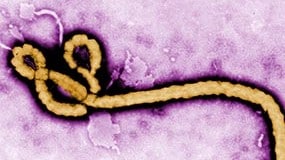What to know
Mothers with confirmed or suspected Ebola disease should not breastfeed their infants.

About Ebola disease
Ebola is a rare and deadly disease caused by an infection with a group of viruses within the genus Orthoebolavirus. Orthoebolavirus is spread through direct contact with blood and other body fluids—including breast milk, urine, saliva, sweat, feces, vomit, and semen—of a person who is sick with or has died from Ebola disease. Ebola disease outbreaks in people occur primarily on the African continent.
Mothers with Ebola disease should not breastfeed
Orthoebolavirus has been detected in samples of breast milk, but no data exist to confirm when in the course of the disease the virus appears in breast milk or when it is cleared. Therefore, women with confirmed Ebola disease and women who recently recovered from Ebola disease should not breastfeed their infants.
Learn more about the breastfeeding recommendations, safe handling of breast milk, and care of a neonate born to a patient with confirmed or suspected Ebola disease.
Mothers who become pregnant after recovery
It is safe for mothers who became pregnant after recovering from Ebola disease to breastfeed. There is no known risk of transmission of orthoebolavirus through breastfeeding for infants born to women who become pregnant after recovering from Ebola disease. Breastfeeding is safe and should be recommended for these women. Learn more about guidance for screening and caring for pregnant women with Ebola disease.
Handling breast milk in health care settings
Standard precautions for preventing the transmission of bloodborne pathogens do not apply to human breast milk in most circumstances. However, there are no data about the risks from exposure to breast milk containing orthoebolavirus in health care settings.
When a mother is under evaluation for, or has confirmed Ebola disease, personal protective equipment guidance should be followed by anyone handling her breast milk. The expressed milk of a mother under evaluation for, or with confirmed Ebola disease is considered Category A infectious waste and must be disposed of in accordance with CDC guidance on waste management.
A mother with Ebola disease may want to pump breast milk to relieve engorgement. A mother who has recovered from Ebola disease may want to pump breast milk and have it tested for the virus. In these cases, she should be given single-use disposable pump part kits.
Learn more
- Care of a Neonate Born to a Patient with Confirmed or Suspected Ebola Disease—CDC
- Guidance for Screening and Caring for People who are Pregnant with Ebola Virus Disease for Healthcare Providers in U.S. Hospitals—CDC
- Pregnancy, Labor, and Delivery After Ebola Virus Disease and Implications for Infection Control in Obstetric Services, United States
